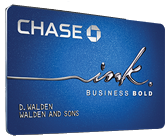Your business may be on the smaller size, but that doesn’t mean you have any fewer responsibilities than big business owners do. In fact, you probably have more on your plate. Chances are you’re involved in operations, human resources, development, marketing – and, of course, finance.
If handled the right way, debt can be a small business owner’s financial friend, and one aspect of that friendship is using the right business credit card. To get you off on the right foot, check out five of the best credit cards for businesses with less than $1M in revenue.
 1. Chase Ink Cash Business
1. Chase Ink Cash Business
The Chase Ink Cash Business Card gets you a $200 bonus when you spend $3,000 in your first three months of membership. You also earn 5% cash back on the first $25,000 spent each year on office supplies, mobile and landline telephone services, and cable TV and Internet services (excluding equipment). In addition, you get 2% cash back on the first $25,000 spent each year on restaurants and gas stations, and 1% on everything else. There’s a 0% introductory APR for the first year on purchases and balance transfers, and no annual fee is charged. Plus, your rewards never expire.
2. Capital One Spark Miles for Business
The Capital One Spark Miles for Business Card gets you 25,000 bonus miles (good for $250 worth of travel) when you spend $5,000 in the first three months. You also earn double miles on all purchases. You can get an additional 5,000 miles when signing up for at least one employee credit card. There is a $59 annual fee after the first year but your ability to earn miles is unlimited.
3. Bank of America Cash Rewards for Business MasterCard
The Bank of America Cash Rewards for Business MasterCard gives you 3% cash back on gas and office supplies (capped at $250,000 in purchases each year), 2% at restaurants, and 1% on everything else. Cash back is unlimited. The card has a 0% introductory APR for the first nine months on purchases, and there’s no annual fee.
4. CitiBusiness Thank You Card
The CitiBusiness Thank You Card comes with a 15,000 point bonus when you spend $3,000 in the first three months (good for $150 in gift cards) and you get triple points on a rotating set of business purchase categories such as computer equipment, hotels, and advertising services. It has a 0% introductory APR for the first six months on purchases, and no annual fee. Your ability to earn points is unlimited.
5. U.S. Bank FlexPerks Business Travel Rewards Visa Signature Card
If travel is a big part of your business regimen, try the U.S. Bank FlexPerks Business Travel Rewards Visa Signature Card. Make $3,500 in purchases in the first four months of membership and you receive 20,000 bonus FlexPoints, good for $400 worth of travel. You get double points on airline tickets, gas, many cell phone purchases, and office supplies, and triple points for charitable contributions. And there’s no cap on the rewards you can earn. You also receive a $25 travel voucher every time you book a reward flight, good for baggage fees or in-flight food. There’s no annual fee for the first year, and it is also waived every year you spend $24,000. When you don’t, it’s $55 per year plus $10 if you have employee cards. There’s a 0% introductory APR for the first 12 months on purchases and balance transfers.
Conclusion
One thing to remember – business credit cards are not subject to the Credit CARD Act of 2009. That means that the terms of a business credit card could change at any time and your payments could be applied to lower interest rate balances first. This shouldn’t dissuade your from applying for a business credit card, just be sure you know what you’re getting into before signing on the dotted line.
Do you know of any other good credit cards for business with less than $1M in revenue?
More Questions? Ask your business questions or find a bookkeeper online.
Related Articles
->Protections For Small Business Credit Card Holders Continue To Lag
->A Small Business Growth Story To Emulate
->How Can You Expand Your Small Business?
->How Can New Businesses Keep Growing After The Big Launch
->The Most Important Milestones For A Startup
->Advice For Launching A Product In A New Market
->Updating Your Five Year Strategic Plan
->How Can You Expand Your Home-Based Business?
->Identifying The Best Location For Your Business
->What Are The Characteristics Of A Long Lasting Company?
->How Can You Sell Your Product To Big Brands?


